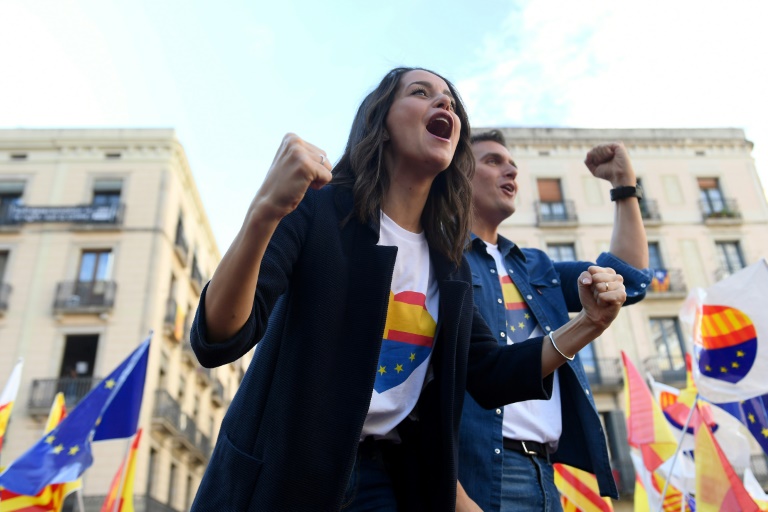
BARCELONA - Ahead of next month's general election, Spain's Socialist Prime Minister Pedro Sanchez faced sharp criticism Sunday for his handling of violent Catalan separatist protests even as calm returned to Barcelona and other cities.
Hundreds of people packed a square in front of Catalonia's regional government headquarters in Barcelona for a rally by the centre-right party Ciudadanos to demand that order be restored.
They also called on the government in Madrid to defend the rights of Catalans who oppose independence.
Many waved Spanish, Catalan and European Union flags and chanted "Viva Espana!".
Ciudadanos leader Albert Rivera repeated a call for Sanchez to suspend Catalonia's autonomy, as Madrid did in 2017 after the Catalan parliament declared independence following a banned referendum.
Rivera also urged Sanchez to get rid of Quim Torra, the head of Catalonia's separatist regional government.
"What is he waiting for?," Rivera asked.
The streets of Barcelona and other Catalan cities have been rocked by protests since Spain's Supreme Court sentenced nine separatist leaders last Monday to jail terms of up to 13 years for sedition over the failed 2017 independence bid.
Demonstrators have set fire to cars and garbage bins and thrown rocks at police who have responded by using their batons and firing rubber bullets.
Another protest was scheduled for 6:00 pm (1600 GMT) outside of the central government's office in Barcelona.
Nearly 600 people have been injured in clashes with police since the protests started. A police officer was in very serious condition and a demonstrator was in critical condition according to Barcelona mayor Ada Colau.
"Separatists are savages...the government must act because what is happening is a disgrace," retiree Roberto Salas told AFP at the Ciudadanos rally.
- 'What more must happen' -
Speaking at a party meeting in Toledo, central Spain, the head of the main conservative opposition Popular Party (PP), Pablo Casado, said Spain needed "a real government, a government that leads."
"What more must happen in Catalonia for order to be restored? That Barcelona be set ablaze? They already do it every night," he added.
On Saturday, Torra called for "unconditional" negotiations with Sanchez in what appeared to be aimed at ensuring that a legal referendum on independence, currently a non-starter for Madrid, was up for discussion.
Sanchez, who came to power in June 2018 with the support of Catalan separatist parties, refused to meet with Torra until he "clearly" condemned this week's violence and recognised that half of Catalonia's roughly 7.5 million residents do not want independence.
A poll published in July by a public Catalan institute showed support for an independent Catalonia at its lowest level in two years, with 48.3 percent of people against and 44 percent in favour.
The court's decision has thrust the Catalan dispute to the heart of the political debate ahead of Spain's November 10 general election, its fourth in as many years.
- 'Moving forward' -
According to the first poll since Monday's verdict, the ruling Socialists are likely to secure the most votes but again fall short of a majority. The PP was tipped to make significant gains.
Published by the daily El Mundo on Thursday, the survey predicted Sanchez's Socialists would capture 122 seats in the 350-seat parliament, slightly down from 123 it took in the last election in April, while the PP would win 98 seats, up from 66.
"Order and territory has never been a winning bet for the Socialists," Pablo Simon, a political science professor at Madrid's Carlos III university, wrote in a blog post.
He added that the Catalan crisis will "increase polarisation" which would benefit parties with more extreme positions like the far-right Vox and radical separatists CUP.
Barcelona returned to relative calm Saturday night after six days of demonstrations against the jailing of separatist leaders.
But on iconic Las Ramblas street, protesters set up barricades and lit fires before they were dispersed by police firing foam projectiles.
"The disturbances are getting smaller but we will keeping moving forward with our plan to end them," Interior Minister Fernando Grande-Marlaska told a news conference.